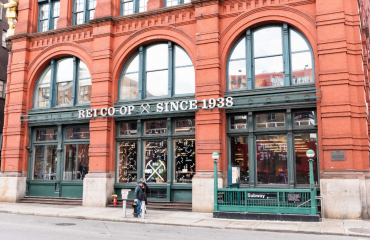With Charitable Partnerships and Loyalty Programs, the Wine Industry Embraces Affinity Marketing – VinePair
words: Roger Morris
illustration: Danielle Grinberg
You’ve heard the saying, “You are what you eat.” Does that also mean we are what we drink?
An increasing number of wineries seem to think so, reaching out to their customers through special labeling, website commentary, and wine club emailings to tap into shared interests — thus enhancing the wineries’ brands, ensuring drinker loyalty, and increasing wine sales.
In the mid-1980s, a small Delaware bank called MBNA became a major financial institution when it discovered people loved to see the names and logos of their alma maters, their favorite sports teams, or even social causes boldly printed on their credit cards. These new cards, which constituted a disruptive step by replacing a bland bank’s name, became known as “affinity cards.”
Now, wineries are discovering that this affinity marketing works with wine buyers as well, as wine drinkers clamor for bottles affiliated with a specific racial, ethnic, or gender identity; social or medical cause; or even grape variety — especially if the winery gives a donation for each bottle purchased.
“Gen Z is driving minority-owned alcohol brands,” says 360PR publicist Catie Valzania, citing a recent Drizly survey that showed, “Nearly one third of Gen Z buyers polled cited minority-ownership — BIPOC, women, AAPI, LGBTQ+ and so on — as their biggest purchase driver apart from price.”
Wine drinkers are notorious cheerleaders for their favorite varietals and wine blends. One of the earliest fan clubs was the Rhone Rangers, spurred on by Randall Grahm’s loony Bonny Doon blends and labels featuring grapes originating in France’s Rhône Valley. Lovers of Bordeaux blends (meritages) and ZAP (Zinfandel Advocates & Producers) were not far beyond. And older readers developed an affinity for Pinot Noir through the inebriated rants of Miles in the 2004 movie “Sideways.”
Much recent affinity wine marketing has been altruistic, centering around medical causes. The fight against breast cancer has resulted in the color pink and rose-colored bows appearing on many labels. One longtime supporter has been Cline Cellars, which has made large donations to the National Breast Cancer Federation and the Susan G. Komen Foundation.
This past summer, California winery J. Lohr showed its support of the National Kidney Foundation (NKF) by launching a “Words & Wine” book club, a portion of whose proceeds goes to the foundation. For an August Facebook Live event, and later for the NKF 33rd annual authors luncheon, Lohr offered an online package of three of its varietals along with novelist Brit Bennett’s “The Vanishing Half” for $99. As part of its affinity pitch, Lohr offered a 15 to 20 percent price reduction for club members.
Benovia Winery creates special labels for charities. Its “Liberation” line of Pinot Noirs and Chardonnays, initially commemorating the 75th anniversary of the liberation of France in World War II, donates $10 from each purchase to the Gary Sinise Foundation, which honors and supports defenders, veterans, first responders, their families, and those in need. And a portion of its “Courageous Care” Pinot Noir sales go to Feeding America and Direct Relief.
In Italy, one of the world’s oldest wine families, the Frescobaldis, started one of the world’s most ambitious “cause” projects 10 years ago, hiring inmates on the prison island of Gorgona to tend vineyards and make wine there. Frescobaldi uses the grapes in its Gorgona red and white to fund the project, with each bottle selling for more than $100. Moreover, Frescobaldi helps inmates use these skills to get jobs in wine production, including at Frescobaldi, once released.
“Here on Gorgona, surrounded by its scents and tastes, is everything one could want: love for this island, man’s loving attention, hope for a better life,” says winery CEO Lamberto Frescobaldi. “All elements that combine to bring forth a wine that is inimitable, innately exclusive, [and] a symbol of hope and freedom.”
The way these wineries inform customers about the causes they support usually goes beyond labels. “Each year, we donate one percent of sales to charitable organizations delivering healthy food to those in need,” says Dana Spaulding, founder and CEO of Wander + Ivy. “When customers visit our online wine shop, they see our mantra: ‘One glass for you, one percent for them.’ When shopping for the wines in store, customers also learn about our mission via our custom displays and signage.”
While wine app Sippd doesn’t make wine, it guides its users to producers whose values align with their own through its “Shop What Matters to You Collection,” featuring wineries that support animal welfare and Covid-19 relief or are Black-owned. “Inclusivity is a crucial part of our company initiatives,” says Blake Hershey, Sippd’s CEO. “Our team is proud to highlight diverse owners and amplify the reach of brands committed to the positive change needed in our society to make a lasting impact”
During Covid-19 lockdowns, wineries hosted online events and direct-to-consumer appeals via one of the strongest affinity vehicles of all: winery clubs and loyalty programs. As a result of this increased direct-to-consumer reach, a 2021 Silicon Valley Bank report predicts online DTC efforts “will represent 20 percent of an average winery’s sales within five years.”
Next up? In addition to its charity bottlings, winegrower The Setting has begun offering special-label wines for event marketing, with clients including the Los Angeles Lakers. So the next time you want to “cheer” your team, it may be offering up a toast with a glass of its affinity wine.
This story is a part of VP Pro, our free content platform and newsletter for the drinks industry, covering wine, beer, and liquor — and beyond. Sign up for VP Pro now!
Published: February 1, 2022



